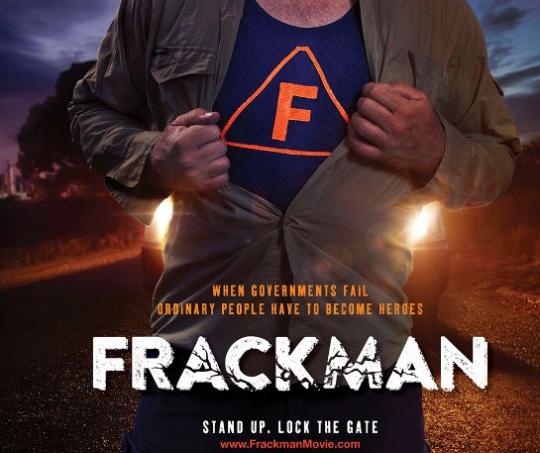
Frackman
Directed by Richard Todd
http://frackmanthemovie.com
Frackman is a new documentary that follows the story of self-proclaimed “worst environmental activist ever” Dayne Pratzky, a resident of the Tara Estates, Chinchilla, in Queensland.
The film takes a narrative approach from Pratzky’s perspective, starting in 2010 when he is first told that a gas well is going to be built on his property. Pratzky and several neighbours start working together to take on international gas companies in a bid to stop wells from being built on their property.
The film then follows Pratzky’s search for information, as he speaks to other property owners and farmers in the region who have had gas wells built on their property. Pratzky learns these wells have led to severe contamination of water — so bad that the water actually bubbles due to the gas being released from the ground and is now flammable.
Another issue for property owners is the 24-hour noise and lights on their property caused by gas wells being in constant operation, as well as trucks coming and going at all hours.
Perhaps the most dire consequence is the health issues caused by the wells, leading to children being hospitalised.
There is also a complete lack of information provided to property owners about what the international gas companies were doing on their land.
Pratzky soon learns that the burden of proof to substantiate that gas wells near people’s homes and farms are dangerous falls on the residents themselves. He then undertakes a series of covert operations, including disguising himself and a mate as workers for a gas company, in a bid to place trackers on the gas trucks. There were also night-time operations in which Pratzky sneaks into closed sites to take water and soil samples for analysis.
Pratzy becomes “Frackman”, an anti-fracking vigilante doing what it takes to oppose the international gas companies with some support from his neighbours. Along the way, he makes some unlikely allies, including conservative radio shock jock Alan Jones who also takes on the cause.
However, despite the time and effort put in, and the financial cost, Pratzky was ultimately unable to stop the gas company coming on to his property. After years of trying, he feels he has no option but to sell up and leave, as others before him did.
The film portrays the story and actions of an individual man trying to take on multinational corporations with a bit of help from those around him. Despite being entertaining, the film lacks a focus on the sort of collective organising and action that might be able to defeat such forces.
There is nothing shown of the community trying to build a grassroots campaign to draw in broader layers of people — such as took place elsewhere. Perhaps by the stage the documentary features, it was too late for such a campaign to protect property owners. Perhaps there was more community organising, but the film fails to document it.
The film shows that one individual, with a bit of support, cannot successfully take on international gas companies and win. A campaign needs much more force than that to take on corporations.
Despite all his efforts, Pratzky gives up in the end, giving the film a demoralising ending. But in other places, communities have defeated or pushed back gas companies.
Australia is set to become the world’s largest gas exporter, with more than 30,000 gas wells in Queensland alone. There are also ongoing campaigns in NSW and Victoria to prevent gas wells and fracking for unconventional gas.
The best strategy is collective organising that seeks to draw in the broadest layer of people to take up the fight directly against these companies — and the governments that give them licenses.
[There are screenings planned across the country for July and August. Visit FrackmanTheMovie.com for details.]
Like the article? Subscribe to Green Left now! You can also like us on Facebook and follow us on Twitter.